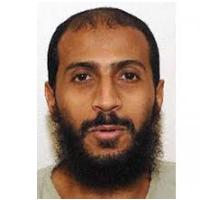Debate over Conspiracy as War Crime Casts Shadow across Guantánamo Detainee Conviction
 Ali Hamza al-Bahlul (photo: MCT/Getty Images)
Ali Hamza al-Bahlul (photo: MCT/Getty Images)
By Charlie Savage, New York Times
WASHINGTON — A federal appeals court Thursday upheld a military commission’s conviction of a prominent Guantánamo Bay detainee on the charge of conspiracy to commit war crimes, salvaging a rare successful outcome for the troubled tribunals system.
But the divided ruling left unresolved a broader legal question that could help determine whether the tribunals system takes root as a permanent alternative to civilian court for prosecuting terrorism suspects or fades away after the handful of current cases come to an end.
That question is whether the military commissions can be used to prosecute additional terrorism defendants for conspiracy. That charge is useful for trying people suspected of participating in a terrorist organization. But while conspiracy is considered a crime under domestic law, it is not a war crime recognized by international law. Generally, tribunals are used to prosecute war crimes.
“There is still no resolution of this basic constitutional question that has been dogging the commissions since their inception,” said Stephen I. Vladeck, a law professor at the University of Texas. “The court let this one conviction stand, but in the process, it didn’t actually settle the fight.”
The case centers on Ali Hamza al-Bahlul, a Yemeni who admitted that he made a propaganda video for al-Qaida about the bombing of the U.S. destroyer Cole in 2000; helped administer loyalty oaths to several of the Sept. 11 hijackers; made martyrdom wills for them; and helped Osama bin Laden listen to news broadcasts about the attacks.
In 2008, after boycotting his trial, al-Bahlul was convicted by a military commission on several charges, including conspiracy, and sentenced to life in prison. But military defense lawyers appealed, leading to a convoluted legal case that has twice reached the full appeals court.
Along the way, al-Bahlul’s other convictions were thrown out because those charges were not war crimes, either. But after an internal argument, the Obama administration decided to keep appealing in an attempt to salvage his conspiracy conviction — and, by extension, military prosecutors’ ability to charge defendants with that offense in the future.
The government pointed to several examples in which U.S. military commissions had brought that charge in previous wars and noted that Congress, in 2006 and 2009 laws, authorized commission prosecutors to invoke it. Defense lawyers argued that the charge is nevertheless illegitimate because the Constitution did not empower Congress to make it available to tribunals.
Last year, a three-judge panel on the appeals court voted, 2-1, to throw out the conspiracy conviction. But Thursday, the full appeals court voted, 6-3, to affirm the same conviction.
Four of the six judges in the majority — Janice Rogers Brown, Thomas B. Griffith, Brett Kavanaugh and Karen L. Henderson, all of whom were appointed by Republican presidents — argued that Congress had the constitutional power to authorize bringing conspiracy charges in the war crimes court, despite international law.
“Wherever one might ultimately draw the outer boundaries of Congress’ authority to establish offenses triable by military commission, the historically rooted offense of conspiracy to commit war crimes is well within those limits,” Kavanaugh wrote.
Writing separately, the other two judges in the majority — Patricia Ann Millett and Robert L. Wilkins, both Democratic appointees — agreed that al-Bahlul’s conviction should be upheld but cited different legal reasons specific to his case. They expressed no opinion about the broader issue of conspiracy charges.
In dissent, the other three judges — Cornelia T.L. Pillard, Judith W. Rogers and David S. Tatel, all Democratic appointees — said conspiracy charges could never be brought in a commission. As a result, there was no majority to resolve the bigger question about such charges.
To Learn More:
5 Guantánamo Detainees, Never Charged with a Crime, are Released after 14 Years (by Noel Brinkerhoff and Danny Biederman, AllGov)
Appeals Court Ruling Challenges Legitimacy of Military Commissions For Guantánamo Prisoners (by Noel Brinkerhoff, AllGov)
Obama Signs into Law Indefinite Detention of Americans without Trial (by David Wallechinsky and Noel Brinkerhoff, AllGov)
35,000 Convicted of Terrorism Since 9/11…But How Many were Really Terrorists? (by David Wallechinsky and Noel Brinkerhoff, AllGov)
- Top Stories
- Unusual News
- Where is the Money Going?
- Controversies
- U.S. and the World
- Appointments and Resignations
- Latest News
- Can Biden Murder Trump and Get Away With it?
- Electoral Advice for the Democratic and Republican Parties
- U.S. Ambassador to Greece: Who is George Tsunis?
- Henry Kissinger: A Pre-Obituary
- U.S. Ambassador to Belize: Who is Michelle Kwan?






Comments